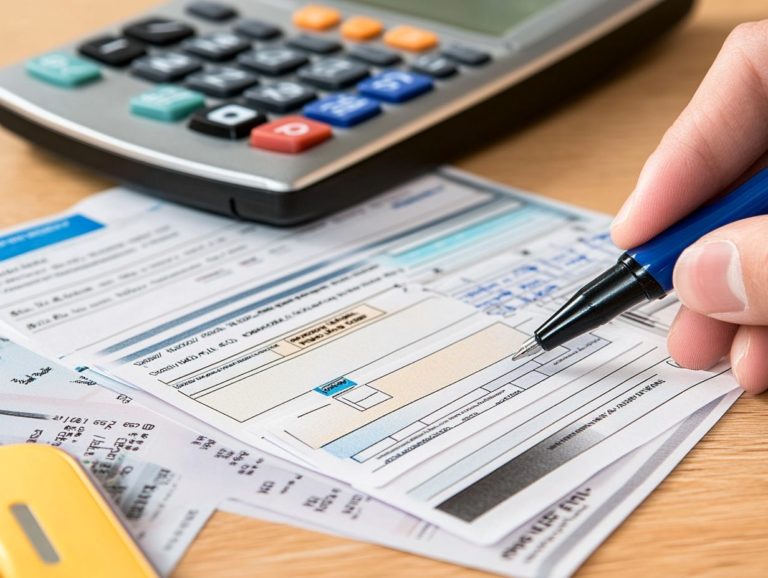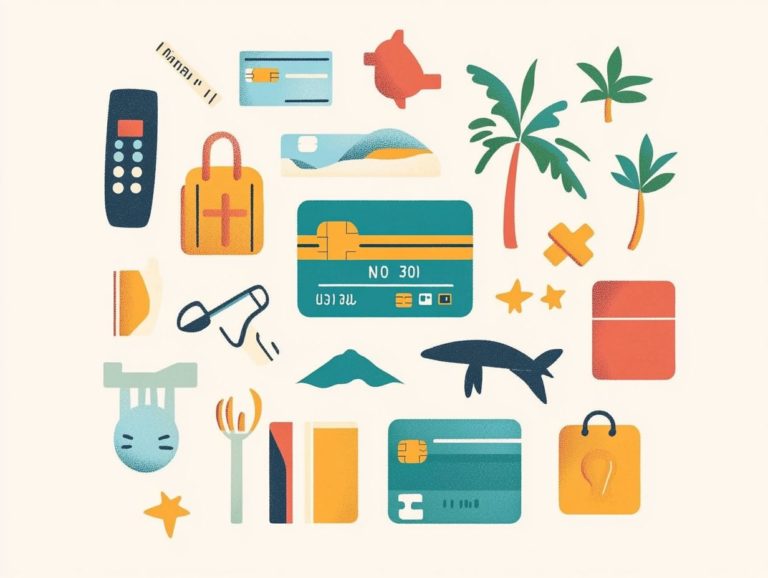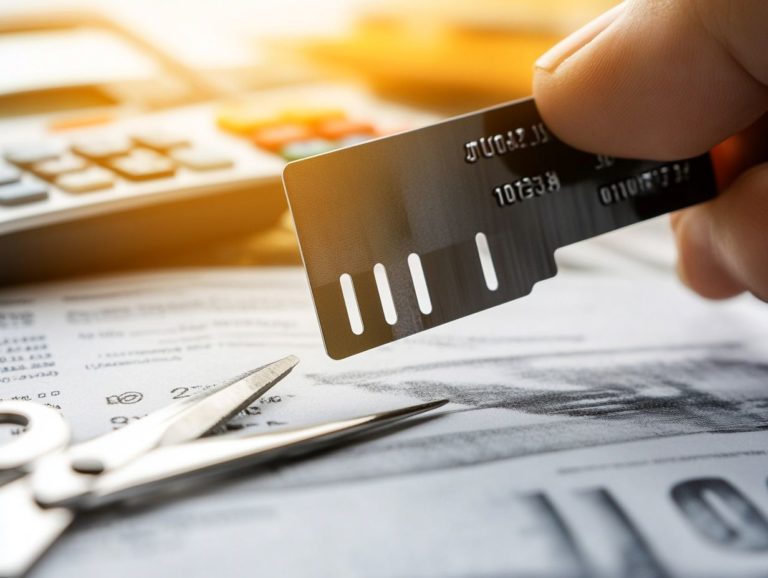What to Do If Your Credit Card is Stolen
Experiencing the theft of your credit card can be a deeply unsettling event. It leaves you with a sense of vulnerability and anxiety regarding your finances.
It’s important to act quickly and understand the necessary steps to mitigate potential damage. From reporting the theft to your bank and canceling the card, to monitoring your accounts and recovering from fraud, this guide provides essential actions to safeguard yourself.
It also outlines preventative measures to help protect your finances moving forward. Dive into this guide now to equip yourself with the knowledge and strategies needed to navigate the complexities of credit card theft.
Contents
- Key Takeaways:
- Steps to Take Immediately When Your Credit Card is Stolen
- Protecting Your Finances After a Credit Card Theft
- Recovering from Credit Card Fraud
- Preventing Credit Card Theft
- Frequently Asked Questions
- 1. What should I do if I realize my credit card has been stolen?
- 2. Should I also report the theft to the police?
- 3. Will I be responsible for any fraudulent charges made on my stolen credit card?
- 4. What information should I have ready when I call my credit card issuer?
- 5. Can I still use my other credit cards if one of them is stolen?
- 6. How can I prevent my credit card from being stolen in the future?
Key Takeaways:

- Report the theft immediately to your bank or credit card company. This must be your top priority to prevent any further unauthorized charges.
- Monitor your accounts for any suspicious activity. Update automatic payments and subscriptions to prevent future fraud.
- If you fall victim to credit card fraud, file a report. Dispute any unauthorized charges, take steps to repair your credit score, and consider alternative payment methods for added security.
Steps to Take Immediately When Your Credit Card is Stolen
Upon realizing that your credit card has been stolen or misplaced, act quickly to safeguard your finances. This reduces the risk of identity theft. Swift action can help prevent unauthorized charges from tarnishing your credit report and financial standing.
Start by contacting your credit card issuer to report the incident. Set up a fraud alert, which is a warning that helps protect against unauthorized transactions. Be prepared for the next steps, such as replacing your credit card and monitoring your credit report for any irregular activity.
Reporting the Theft to Your Bank or Credit Card Company
Reporting the theft of your credit card to your bank or credit card company should be your immediate priority. This helps prevent unauthorized charges and safeguards your financial information.
Acting swiftly is essential. It can significantly minimize potential losses and facilitate the recovery of your funds. When you reach out to your issuer, ensure you have specific details ready, such as your account number, the exact date and time you noticed the theft, and any unauthorized transactions that have taken place.
Many financial institutions provide transaction alerts, which notify you of any suspicious activity in real-time. Filing a police report is also a smart move. It aids in investigations and provides proof of the theft when disputing fraudulent charges.
Cancelling the Stolen Card and Issuing a New One
After reporting the theft, your next crucial step is to cancel the stolen card. Initiate the process of replacing it to prevent further unauthorized access.
To effectively reach your credit card issuer, locate the customer service number on their website or through their mobile app. Once connected, the representative will guide you through the cancellation process. This typically involves answering security questions to verify your identity.
After cancellation, the issuer can expedite the issuance of a new card. This usually arrives within a few days. Implementing a security freeze during this period adds an extra layer of protection against unauthorized accounts being opened in your name.
It’s essential to monitor your account vigilantly for any suspicious activity. This ensures you can take rapid action in the unlikely event of fraudulent transactions.
Protecting Your Finances After a Credit Card Theft
Once you report your stolen credit card and replace it, the proactive steps you take can profoundly impact your financial decisions and security in the future.
Embracing vigilance and strategic planning now will empower you to navigate your financial landscape with confidence.
Monitoring Your Accounts for Suspicious Activity

Monitoring your accounts for suspicious activity is essential for your safety. This is especially true after experiencing credit card theft.
Set up transaction alerts through your bank or credit card provider for added protection. These notifications keep you informed with real-time updates on account activity.
Regularly reviewing your bank and credit card statements is also crucial. Familiarizing yourself with your personal spending patterns makes it easier to identify potential fraud.
If you notice anything unusual, act fast! Report it to your financial institution right away to mitigate losses and help maintain your financial security.
Updating Automatic Payments and Subscriptions
Updating your automatic payments and subscriptions after replacing your credit card is crucial. This prevents service interruptions and unauthorized charges.
Start by reviewing all the subscriptions and services linked to your previous card. Create a comprehensive list to ensure nothing slips through the cracks.
Then, visit each service s website or app to access the payment settings. Input your new card details to protect yourself from potential lapses in service.
By prioritizing this update, you ensure a smooth and uninterrupted experience with your favorite platforms.
Recovering from Credit Card Fraud
Recovering from credit card fraud can feel overwhelming, but taking the right steps helps you regain control over your financial future.
Filing a fraud report documents the theft and helps dispute unauthorized charges. First, reach out to your credit card issuer with details about the fraudulent activity.
After this initial communication, meticulously review your recent account statements to pinpoint any suspicious transactions.
Filing a police report can strengthen your case. Many credit card companies require it for dispute documentation, and it serves as essential evidence.
Repairing Your Credit Score and Rebuilding Trust
Repairing your credit score after credit card fraud can feel daunting but is crucial for preserving your financial reputation.
Prioritize timely payments on existing debts. A consistent payment history is key in credit evaluations.
Also, regularly monitor your credit report for mistakes or unauthorized charges. Swiftly identifying and disputing these errors helps you rebuild trust with potential lenders.
Preventing Credit Card Theft

Preventing credit card theft demands a thoughtful blend of awareness, best practices, and informed financial choices. By staying vigilant and implementing these strategies, you can effectively safeguard your identity and protect your finances.
Best Practices for Keeping Your Credit Card Safe
Implementing best practices for safeguarding your credit card can significantly diminish your chances of falling victim to identity theft and fraud.
To elevate your security, consider setting up alerts through your mobile banking app. This enables you to receive real-time notifications for any transactions, allowing for swift action if any suspicious activity arises.
When you shop online, it s essential to confirm that the websites are secure. Always look for https:// in the URL and a padlock icon in the address bar.
Regularly changing your passwords is a wise move. Strong, unique passwords serve as a formidable barrier against unauthorized access, effectively protecting your financial information from potential threats.
Alternative Payment Methods to Consider
Exploring alternative payment methods can significantly enhance your security and reduce the risks associated with identity theft and credit card fraud.
With the rise of digital wallets, you can securely store multiple payment options on your devices. These wallets often employ high-level security features, ensuring your personal information remains confidential during each transaction.
Prepaid cards add another layer of protection, allowing you to manage your spending without exposing your primary bank accounts. These methods not only safeguard you against unauthorized access but also empower you to make informed financial choices, fostering greater peace of mind in your purchasing behavior.
Watch this important video to learn more about keeping your credit card safe!
Frequently Asked Questions
-
1. What should I do if I realize my credit card has been stolen?
-
2. Should I also report the theft to the police?
-
3. Will I be responsible for any fraudulent charges made on my stolen credit card?
-
4. What information should I have ready when I call my credit card issuer?
-
5. Can I still use my other credit cards if one of them is stolen?
-
6. How can I prevent my credit card from being stolen in the future?
If you discover your credit card has been stolen, call your credit card issuer immediately. They can cancel your card and prevent further charges.

Yes, report the theft to the police as soon as possible. This creates an official record of the theft and may be necessary for legal action or insurance claims.
No, as long as you report the theft promptly and follow your credit card issuer’s policies, you will not be liable for any fraudulent charges made on your stolen card.
Have your credit card number, the date and time of the theft, and a list of any recent charges made on the card before it was stolen.
Yes, you can still use your other credit cards as long as they have not been compromised. However, monitor all your credit card accounts closely after a theft to ensure no other fraudulent charges have been made.
To reduce the risk of future credit card theft, keep your card in a secure location, never share your card information with anyone, and regularly check your credit card statements for unauthorized charges.






